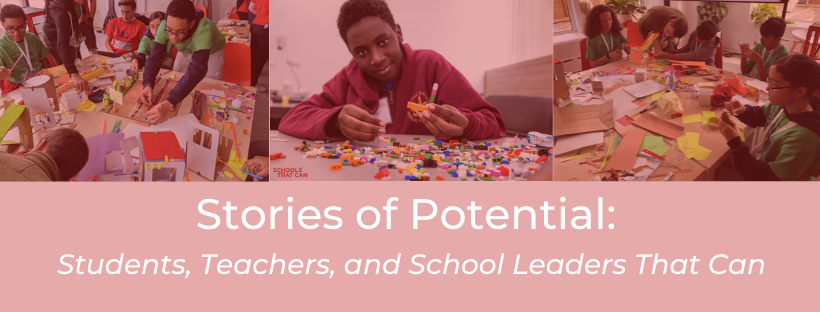
TJ Pavlov, Real-World Learning Manager and Social Science teacher at Chicago Tech Academy, views his work in two buckets: real-world learning and postsecondary planning. Around five years ago, Chicago Tech Academy adopted a project-based learning model, a shift away from what he describes as “traditional” rigid instruction,” that created opportunities for real-world learning to become part of the school’s identity. “Schools That Can has, and continues to be, a critical piece for my professional development. The tools and resources are extremely helpful to my work,” he says, citing the Real-World Learning Rubric, and design thinking framework. “But what I think is most important is the connection to the network of educators from across the country doing similar work to mine,” he continued. “I have developed relationships with many great thought partners through the local Chicago PLGs and from across the country by participating in the Annual Forum and the TLC.”
Over the last several years, Pavlov explains, real-world learning at ChiTech has “evolved to meet the needs of our students and continues to provide all students with impactful opportunities to interact with the world outside of our school walls.” He works closely with their Director of Corporate Engagement, Tashiara Little, to plan and execute a variety of programs that range from Power Lunches with industry professionals, to full-time student internships at partner sites.
Pavlov explains that he believes his most significant accomplishment within real-world learning work is the attention that has been attracted to their programming from around the country. “I am extremely fortunate to work in a school that allows me and my counterpart to build programs that serve a major need for our students but can easily be seen as “extra,”” Pavlov says. “RWL is a part of our school’s DNA and STC allows that to be shared with others.”
He also shares that he wishes people understood the amount of time, effort, and resources it takes to grow successful real-world learning programs like those at ChiTech, explaining that there are barriers that exist in traditional school models that can make executing the work a challenge. “Corporations and community based organizations should put pressure on school districts to evaluate how the learning experience for students can be more impactful and reach beyond any one classroom,” Pavolv explains. He also says that ChiTech is a learning institution, not a staffing agency, pointing out that they expect industry partners to truly partners in the education of young people. “There are some things that a 17 year old will not know when they start their internship or begin a project consultancy,” he continues. “Most of our industry partners grew up in a different generation than our students, often in different communities as well. We expect both sides to learn from one another.”
That ties into why Pavlov believes real-world learning is important, too. “We all hear how rapidly the world is changing and students need to connect so many dots between content standards in their classes, applications of that content in the professional world and the complicated paths they must pave to transition from education to employment,” he says. “There are so many unique career opportunities that are not even on our students’ radars.” Pavlov says he sometimes asks himself why students need to write essays, given that professionals don’t typically write essays in their day-to-day lives. He explains that strong writing skills are important, but that students should practice the type of writing skills that will allow them to thrive in professional environments later on. “I’m just pointing out that RWLreal-world learning programs and opportunities can be hugely beneficial to educators as well,” Pavlov says. “They can see how the application of their content is evolving within the industries that align with their expertise.” It’s work that Pavlov continues to develop, and pursue in his mission of making real-world learning possible for Chicago students, with the help of Schools That Can.
To keep up with Pavlov’s work…
Follow Chicago Tech Academy on Facebook, Twitter and LinkedIn.
Reach out directly via email if you have questions or would like me to send you some of our RWL programming resources – tpavlov@chicagotechacademy.org
Follow me on LinkedIn – www.llinkedin.com/in/tj-pavlov
Stop by ChiTech if you’re ever in Chicago!

